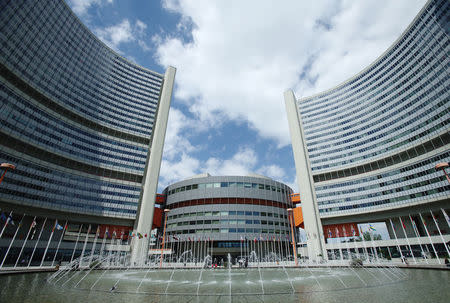UN: Interim deal to help show any military side of Iran nuclear past

By Shadia Nasralla VIENNA (Reuters) - Any possible military dimensions of Iran's nuclear past can be clarified if the details of a preliminary deal sealed in April between Tehran and six world powers are implemented, the head of the U.N. nuclear watchdog said on Monday. Iran has been stalling an investigation by the International Atomic Energy Agency into its nuclear programme. The agency is yet to set a fixed deadline for a final assessment, although it has said the process will not be open-ended. The investigation is running in parallel with political talks between Iran and the six powers which are meant to end in a final agreement at the end of this month. It is the first time Amano has clearly linked the technically separate U.N. investigation into possible military dimensions of Iran's past activities to the political talks Iran is holding with the United States, France, Britain, China, Russia and Germany. "I am confident that the clarification of issues with possible military dimensions is possible within a reasonable timeframe if Iran implements the measures envisaged in the (preliminary)... announcement," IAEA head Yukiya Amano said. "I cannot say how long it will take, but with the cooperation from Iran it is not a matter of weeks and not a matter of years that we can clarify the issues with possible military dimensions", Amano told reporters, implying it would take months once Iran starts to fully work with the IAEA. As part of the initial deal reached in April in Switzerland, Iran was to implement a so-called Additional Protocol giving the IAEA more intrusive access to facilities in Iran. Iranian officials have been giving conflicting messages about what kind of access would be granted to crucial military sites. A senior adviser to Iran's Supreme Leader, who has the last word on foreign policy, said on Monday that no foreigners would be allowed to visit military sites in Iran, in comments carried by state news agency IRNA. "Visiting Iran's military sites is forbidden in the Supreme Leader's view, and permission to visit our sensitive locations will not be given to any foreigners, American or otherwise," Ali Akbar Velayati was quoted by IRNA as saying. "Implementation by Iran of the Additional Protocol will ... significantly increase the Agency’s ability to provide credible assurance about the absence of undeclared nuclear material and activities in (Iran)," Amano said. Once Iran starts to fully implement the Additional Protocol, it would still take years before a broader conclusion can be reached on whether Iran's current programme is fully peaceful, Amano said. Such broad assessments would be reviewed annually. Diplomats have voiced concern that once sanctions relief is granted to Iran in exchange for it curbing its nuclear programme under any final deal, there will be little incentive for Tehran to disclose all details of its past activities to the IAEA. (Reporting By Shadia Nasralla; Additional reporting by Sam Wilkin; Editing by Hugh Lawson)

